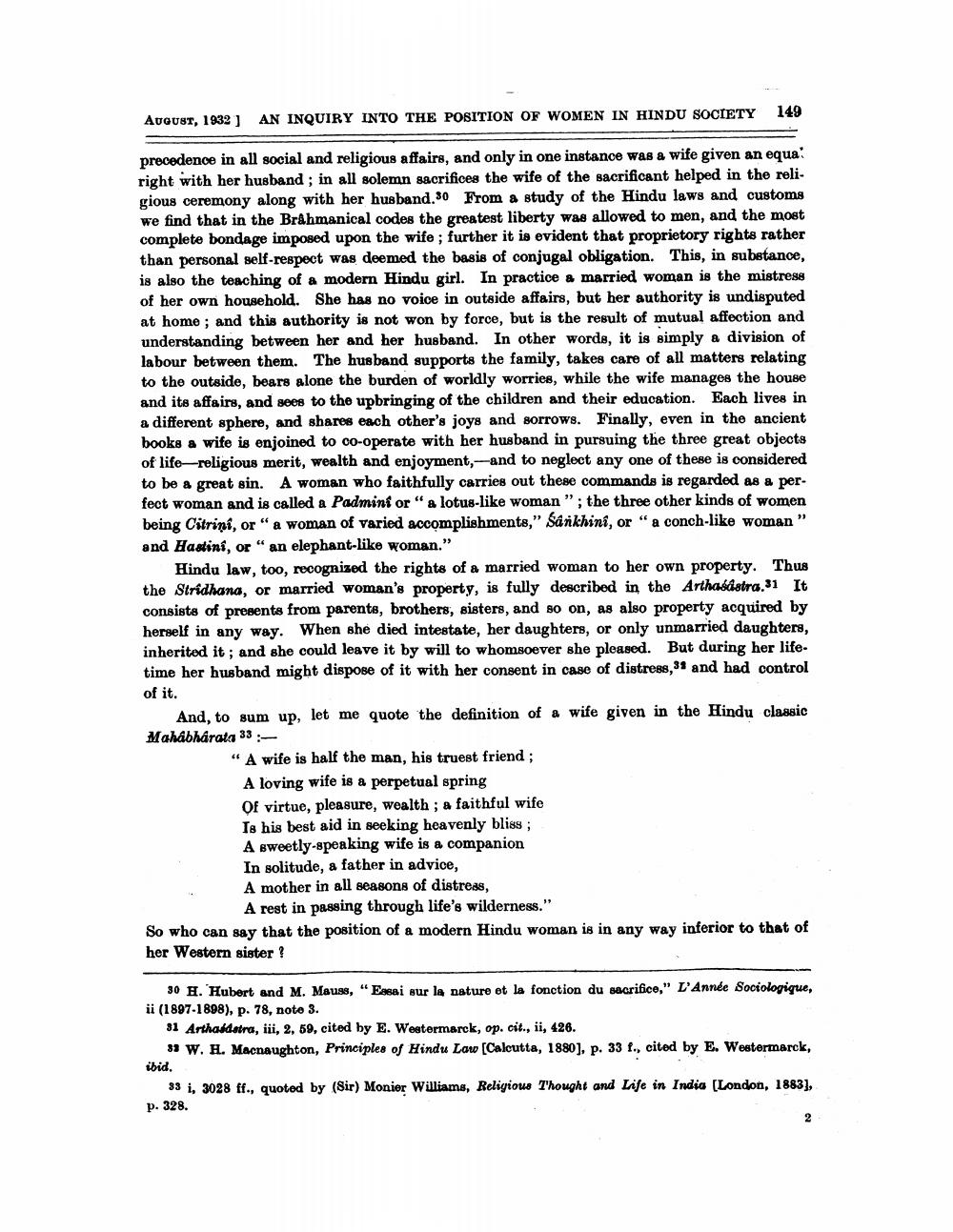________________
AUGUST, 1932 ) AN INQUIRY INTO THE POSITION OF WOMEN IN HINDU SOCIETY
149
precedence in all social and religious affairs, and only in one instance was & wife given an equa right with her husband; in all solemn sacrifices the wife of the sacrificant helped in the religious ceremony along with her husband.30 From a study of the Hindu laws and customs we find that in the Brahmanical codes the greatest liberty was allowed to men, and the most complete bondage imposed upon the wife ; further it is evident that proprietory rights rather than personal self-respect was deemed the basis of conjugal obligation. This, in substance, is also the teaching of a modern Hindu girl. In practice a married woman is the mistress of her own household. She has no voice in outside affairs, but her authority is undisputed at home; and this authority is not won by force, but is the result of mutual affection and understanding between her and her husband. In other words, it is simply a division of labour between them. The husband supports the family, takes care of all matters relating to the outside, bears alone the burden of worldly worries, while the wife manages the house and its affairs, and sees to the upbringing of the children and their education. Each lives in a different sphere, and shares each other's joys and sorrows. Finally, even in the ancient books a wife is enjoined to co-operate with her husband in pursuing the three great objects of life religious merit, wealth and enjoyment,--and to neglect any one of these is considered to be a great sin. A woman who faithfully carries out these commands is regarded as a perfect woman and is called a Padmini or "a lotus-like woman"; the three other kinds of women being Citrini, or "a woman of varied accomplishments," Sárikhini, or "a conch-like woman" and Hastini, or“ an elephant-like woman."
Hindu law, too, recognized the rights of a married woman to her own property. Thus the Stridhana, or married woman's property, is fully described in the Arthasástra.31 It consists of presents from parents, brothers, sisters, and so on, as also property acquired by herself in any way. When she died intestate, her daughters, or only unmarried daughters, inherited it, and she could leave it by will to whomsoever she pleased. But during her lifetime her husband might dispose of it with her consent in case of distress, 31 and had control of it.
And, to sum up, let me quote the definition of a wife given in the Hindu classic Mahabharata 33 :
"A wife is half the man, his truest friend;
A loving wife is a perpetual spring Of virtue, pleasure, wealth ; a faithful wife Is his best aid in seeking heavenly bliss ; A sweetly-speaking wife is a companion In solitude, a father in advice, A mother in all seasons of distress,
A rest in passing through life's wilderness." So who can say that the position of a modern Hindu woman is in any way inferior to that of her Western sister !
30 H. Hubert and M. Mauss, "Essai sur la nature et la fonction du sacrifice," L'Année Sociologique, ii (1897-1898), p. 78, noto 3.
31 Arthaldatra, iii, 2, 69, cited by E. Westermarck, op. cit., ii, 426.
33 W. H. Macnaughton, Principles of Hindu Laro (Calcutta, 1880), p. 33 f., cited by E. Westermarck, ibid.
33 i, 3028 ff., quoted by (Sir) Monier Williams, Religious Thought and Life in India (London, 1883), p. 328.




